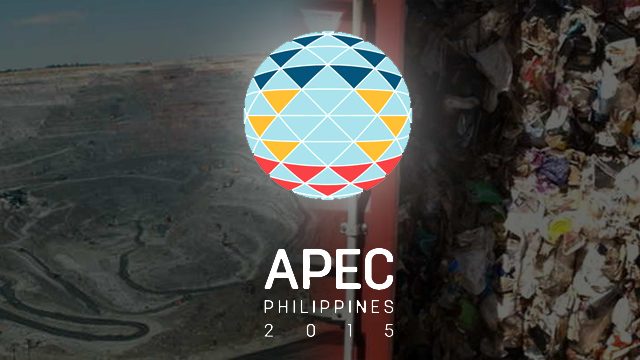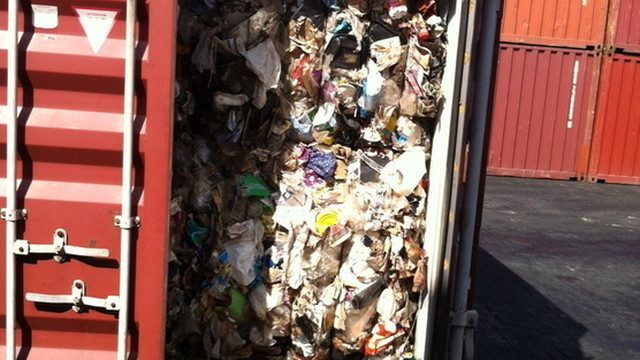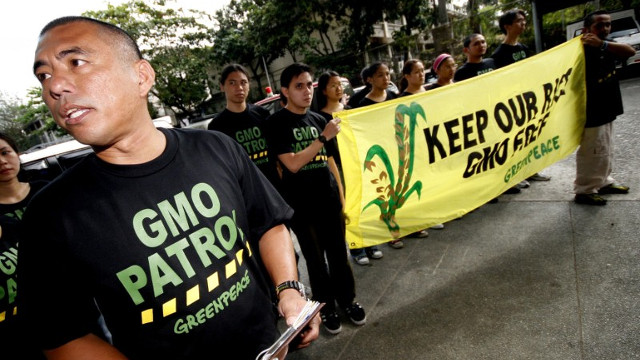SUMMARY
This is AI generated summarization, which may have errors. For context, always refer to the full article.

MANILA, Philippines – The Philippine capital region is in the global spotlight this week, with world leaders arriving in Manila for the Asia Pacific Economic Cooperation (APEC) Summit.
With high-profile personalities expected to attend the regional meet, environmentalists are taking the opportunity to make their concerns on various issues heard.
Here’s what various non-government organizations want to tell APEC leaders.
Australia’s mining activities
Amianan Salakniban, a group of environment and human rights advocates in northern Luzon, has asked Australian Prime Minister Malcolm Turnbull to intervene in the “destructive” operations of Australian mining company Oceana Gold in Nueva Vizcaya province in northern Philippines.
In an open letter, the group’s spokesperson, Fernando Mangili, said toxic mine tailings from the gold and copper mining firm are contaminating the water sources in the community of Didipio, Kasibu, affecting the health of residents living near the mining site.
“Before the mining operations, water for consumption in Didipio comes from natural springs and water pumps which are free for everyone to use. But now, they have to buy mineral drinking water from refilling stations because the water in the area causes stomach aches and skin diseases to residents especially the children,” the group said.
The group demanded the end of the mining firm’s operations in the Philippines, compensation for the residents, and rehabilitation in the areas affected by Oceana Gold.
Mangili added that the benefits enjoyed by Australian mining companies come at the expense of small communities in a developing country like the Philippines.
Canada: Mining operations in the Cordillera
Another group has also demanded a similar pledge from Canada’s newly-elected Prime Minister Justin Trudeau.
In a statement, the Cordillera Peoples Alliance (CPA) urged Trudeau to make good on his promise of encouraging a renewed relationship with indigenous peoples “based on recognition of rights, respect, co-operation and partnership.”
While the statement referred to indigenous peoples in Canada, the CPA said Trudeau should apply the same principles toward the indigenous peoples of the Cordillera in the Philippines.
“The Cordillera experience with Canadian mining companies confirms that Canadian mining companies violate indigenous people’s rights and human rights,” the CPA said.
CPA cited the case of the mining activities of Olympus Pacific Mineral in Baay-Licuan town in Abra. The group said the mining firm violated the rights of the Binongan indigenous peoples by starting operations in their ancestral domain at Mount Capcapo in 2008.
The group also noted that Canadian mining companies dominate the list of foreign mining investors in the Cordillera region, with their mining applications covering several municipalities.
“Cordillera indigenous peoples remain vigilant, and will not allow destructive mining operations especially by foreign mining companies in the region,” CPA said.

Canada’s trash
Aside from mining, Trudeau is also the subject of another petition from environmentalists. Green groups have asked the Canadian prime minister to take back trash imported from Canada to the Philippines – a long-running problem that is already posing health risks to Filipinos.
Groups like Ang NARS party list, BAN Toxics, EcoWaste Coalition, and Greenpeace called on Trudeau and the Canadian Embassy to remove dozens of container vans filled with garbage that had been shipped to Manila during the administration of Trudeau’s predecessor. (READ: Illegal garbage dispute: Why can’t Canada be like Japan?)
The groups also wanted Canada to reimburse the Philippine government for the costs incurred to disinfect container vans which leaked waste fluid.
A change.org petition has also been set up, with nearly 41,000 signatures collected as of Monday, November 16.
“Pick up your imported garbage, Canada. It’s the civil thing to do for a first world country like you,” the petition read.

‘Stop GMO policy integration’
Agriculture groups also want to stop efforts to integrate policies in the Asia-Pacific region concerning genetically-modified organisms (GMOs), citing opposition from various sectors and legal concerns.
Environmental group Greenpeace expressed concern over the Philippine agriculture department’s proposals to set a “common standard” for genetically-modified crops across the region, despite the lack of a scientific consensus on the safety of these crops.
The group added that while the Philippines has a GM crops regulatory system in place, there is still no law governing field-testing, commercialization, and related activities.
Greenpeace, along with groups MASIPAG and Sibat, urged the government to support the development of ecological agriculture instead, an alternative farming method which they say will protect the environment and ensure healthy farming. – Rappler.com
Add a comment
How does this make you feel?
There are no comments yet. Add your comment to start the conversation.